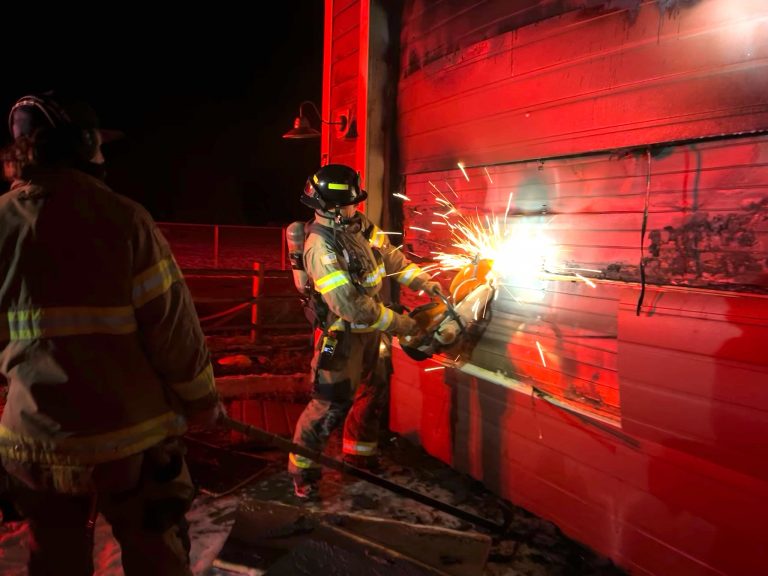
Fire on Fairway Drive destroys home
A home on Fairway Drive is likely a total loss after a fire ripped through the structure on Friday night.

A home on Fairway Drive is likely a total loss after a fire ripped through the structure on Friday night.

Login to continue reading Login Sign up for complimentary access Sign Up Now Close

Login to continue reading Login Sign up for complimentary access Sign Up Now Close
This week Josie Leslie of the McCall-Donnelly girls cross country team and Stuart Derrick of the Cascade High School football team were selected as Athletes of the Week, for the voting round of Nov.
Fees aimed at making growth pay for growth will be studied for McCall after action taken last week by the McCall City Council.The council awarded a $66,000 contract to TischlerBiseGalena, a Boise consulting firm, to study the fees, known as impact fees.Impact fees are one-time payments made to an agency to ensure that the current service levels provided by the agency do not decline as growth occurs.
Stricter rules on cell phones and other personal electronics in school are likely to be adopted soon at the McCall-Donnelly School District, trustees were told on Monday.“We feel like we’re getting close to giving the board a proposed broad policy,” said Payette Lakes Middle School Principal Jake Olson, who was tasked with heading the district’s cell phone policy committee.“It’s really catching on as a trend to be more responsible with cell phone use, not only in our district, but across the nation,” Olson said.Those policy recommendations will likely come in two parts, with one set of rules for students in kindergarten through eighth grade and another for high school students, he said.The committee has met several times since it was formed in August.Cell phones and other electronics are already limited in M-D classrooms, where they are only allowed with teacher approval, but there is no policy restricting phone use at recess, between classes and generally on school property.On Monday, Olson presented the MDSD School Board of Trustees with the results of a recent survey of parents, students and staff on the use of personal electronic devices in school.The survey did not ask what policy should be adopted, instead asking about personal phone use in and outside of classes and whether that use is positive or negative.Olson noted that there was “very little” reporting of phones being a positive influence on students of the 613 parents within the district who took the survey.About 75% of parents were concerned about student phone use.The survey found that phone use doubled at each school, with only 25% of elementary school students using phones in school, compared to 49% at the middle school and 91% at the high school level.In total, 596 students took the survey, including 76 elementary school students, 258 middle schoolers and 251 high schoolers.As students get older, they believe phones offer more benefits, according to the survey.Students reported that it was easy to ignore their phones and academics would not improve with the removal of cell phones.“That is no shocker, and kind of funny,” Olson said of the results.Only 39% of students reported that they used phones in class for personal reasons.Teachers and other staff who took the survey offered a less positive evaluation of phones in class, finding the affects to be “significantly negative,” Olson reported.About 90% of elementary school staff said it was negative compared to 80% of middle school staff and 73% of high school staff.Phones were listed as decreasing engagement and participation, and that they are mostly used for “off-task behavior.”Most teachers wanted the district to adopt stricter guidelines, with some extra leeway for high school students.More than half of all participating high school teachers said that phones should be available for educational purposes and 37% said guidelines for high school students should be flexible.The committee had intended to draft a policy that would start in the fall but that timeline has been moved up following a recent executive order from Governor Brad Little and Superintendent of Public Instruction Debbie Critchfield.The executive order, released on Oct.
A public comment period has been opened for a sewer master plan recently completed by the Payette Lakes Recreational Water and Sewer District.The comment period will be open at least 30 days, or until Dec.
Leaky sewer pipelines are among the biggest barriers to building new housing in McCall, according to a sewer master plan recently completed by the Payette Lakes Recreational Water and Sewer District.The plan, which district engineers started on in 2021, charts all improvements needed for the sewer system to accommodate an estimated 50 years of growth in McCall.About $2.8 million would be spent over the next three years to reduce the millions of gallons of groundwater and stormwater that pour into the sewer system, under the plan.“This continues to be the biggest problem that impacts the sewer system,” said David Watkins of J-U-B Engineers, which led the master plan development.Sewer flows can surge as high as 3.8 million gallons in a day and average 2.2 million gallons per day during spring snowmelt due to the leaks, or twice as much as average peak flows throughout the rest of the year.Since 2021, much of McCall has been limited to one sewer connection per parcel or per acre, regardless of zoning densities set by the city, until the leaks are repaired, either by the district or by developers.The policy is intended to reduce the risk of sewage lines backing up into manholes or homes in parts of the sewer system that lack capacity due to the excess water from the leaks.However, the policy has often created friction between the sewer district and efforts by the city to promote affordable housing development in McCall.If the leaks were fixed, the capacity of the sewer system “far exceeds” current city zoning and other public infrastructure limitations, like public roads and water service, Watkins said.“I think there’s tension right now only because there’s (leaks) and bottleneck issues,” he said.
A potential violation of the Idaho Open Meeting Law was acknowledged and cured by the McCall City Council last week.The violation stemmed from a Nov.
A gold and antimony exploration project bordering Perpetua Resources’ proposed Stibnite Mine has been sold for $2.6 million, Stallion Uranium Corp.